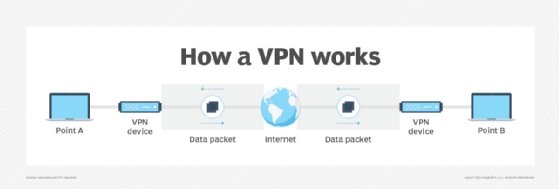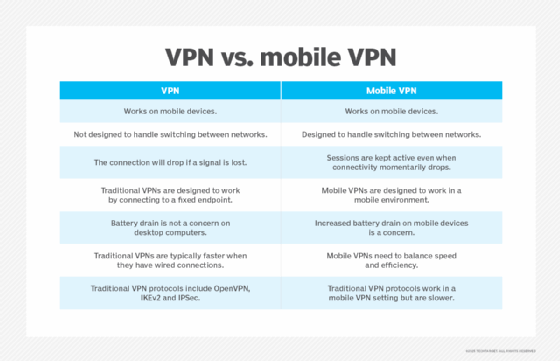What is a mobile VPN?
A mobile virtual private network (mobile VPN) is a type of VPN specifically designed to maintain a stable and secure connection while a user moves across different networks. Mobile VPNs are designed to work on mobile devices that commonly switch between networks, such as smartphones, tablets and laptops.
VPNs themselves are a type of service that creates a safer, encrypted online connection. They are often used over a less secure network -- like unsecured Wi-Fi access points -- to protect data transmissions on devices or to visit region-locked websites. VPNs hide a user's browser history, Internet Protocol address (IP address), geographic location, device and activity. Anyone on the same network can't see what a VPN user is doing, making VPNs suitable for online privacy.
However, VPNs don't provide total security -- a user's information is still being routed to the VPN service; internet service providers (ISPs) can also still see the size of incoming and outgoing traffic; websites can still track users with cookies; and VPNs still can't protect users from malware.
Mobile VPNs are designed to enable the changing of network attachment points, which is useful when workers or individuals need to keep an application session open while they connect to different, potentially open, wireless networks or encounter gaps in their network coverage. Typical VPNs can't endure these events, which might cause an application to time out, disconnect or crash.
How do mobile VPNs work
When connecting to a standard VPN, a user's data is encrypted and tunneled through a connection to a remote server before reaching the internet. This connection is what obscures a user's IP address and how it bypasses geo-restrictions (as the connection to that remote region-specific server is what makes it look like a user is accessing the internet from that region). Tunneling protocols encrypt a user's data at the sending end while decrypting it at the receiving end.

Mobile VPNs work in a very similar way but with added steps that maintain a connection. First, a mobile VPN encrypts a user's internet traffic and routes it through a secure tunnel to a remote VPN server. Once the data reaches the VPN server, it is decrypted before being sent to its intended destination. Each mobile VPN tunnel is tied to a logical IP address bound to the user's mobile device. Mobile VPNs will also use protocols that support network reconnections like IKEv2/IPsec or Wireguard, which helps maintain a consistent connection.
Some mobile VPN apps also offer additional processes that help compress data or minimize battery drain while the VPN is on.

Why are mobile VPNs important?
Although VPNs shouldn't be looked at as an all-encompassing security option, they do have important use cases for individual and business use.
For one, remote employees working on a publicly accessible network might be required to connect to a VPN first, limiting the potential for leaking private or mission-critical data.
Privacy is another major reason many people use a VPN. Aside from the potential vulnerability that comes with connecting to publicly accessible Wi-Fi networks, ISPs also have extensive insight into a customer's activities. Businesses and individual internet users alike can use a VPN to avoid these encroachments on privacy.
Many individuals also use VPNs to circumvent censorship or regionally locked content. VPNs mask IP addresses, meaning the data pertaining to a user's geographical location is also masked. Users can pick a different remote server to connect to in order to access content that might be regionally locked by video streaming services, like Netflix and Disney+, or other companies and agencies.
Mobile VPNs also have the additional benefit of enabling users to move across different networks without the service itself dropping or losing connection.
Factors to look for in a mobile VPN
Several different features define a VPN's usefulness to potential users:
- Battery consumption. Some mobile VPN services will limit battery consumption using different methods, like stopping background processes that could further strain the device's battery.
- Encryption method. VPN providers might use different VPN encryption methods. While multiple methods are available, one of the most commonly used is Advanced Encryption Standard AES-256.
- Kill switch. When a connection is lost on a normal VPN, the user's traffic automatically defaults to their default network connection. A killswitch feature offered by mobile VPNs detects this and stops internet activity until a connection is made back to the VPN.
- Network switching. The main feature of mobile VPNs is their ability to maintain a stable connection when switching between different Wi-Fi and mobile networks.
- Server locations. A VPN allows users to choose which regions they want to connect to. The more geographic locations a VPN service has its servers hosted, the more choices the end-user has and the more it enables users to access different potentially geographically locked content. Likewise, the more servers they have, the less congestion end users experience.
- Split tunneling. This is a feature that enables users to choose which apps use the VPN tunnel while letting other activities travel through their default routing paths.
Likewise, when implementing a VPN, there are a number of implementation methods that an organization can use to best utilize the tool.
Considerations for choosing a mobile VPN
When choosing a VPN, potential users should consider:
- Device compatibility. Most mobile VPN providers offer support for Android and iOS devices, but some might differ in terms of supporting other hardware, like internet-of-things (IoT) devices.
- Laws of the VPN's home country. Depending on where they are based, some VPNs might be required to store and provide data to authorities when requested.
- Multiple devices. Some VPNs will enable end users to access their services across multiple devices.
- Performance and battery consumption. Different mobile VPNs will have varying impacts on device battery and performance.
- Pricing. Most mobile VPNs are priced based on monthly or yearly subscription-based models. Some offerings might also be based on freemium or pay-as-you-go models.
- Reputation. Reputations of VPN companies vary, depending on factors like performance, price, audits, connection data logs, selling of user information or handing over data to local governments.
- Speed. VPNs can be optimized using lightweight protocols, but all VPNs will still slow down the end user's internet to some degree due to traffic needing to be routed through the VPN server in whichever remote location. Depending on the VPN service, these speeds and server locations can differ.
- Support for streaming. Along with speeds, a VPN might differ in relation to streaming capabilities. Users who want to stream video might find streaming capabilities differ from 1080p or 4K qualities.
Top Mobile VPN providers
The following is a sampling of different available mobile VPN providers:
- Cisco Secure Client. This enterprise-focused VPN offering provides a VPN service along with other security features like web filtering, network analytics and endpoint security assessments.
- ExpressVPN. ExpressVPN has acceptable overall performance and does not collect log data.
- NordVPN. NordVPN is known for its performance and a number of available servers worldwide.
- Proton VPN. This privacy-focused VPN option doesn't collect log data and is ideal for more critical and private data.
- Surfshark. This is a budget-friendly option that also offers unlimited simultaneous device connections.
VPNs can be easy for individuals to set up, but they might be a little more complicated for organizations. Learn more about how to set up VPNs for enterprise use.








